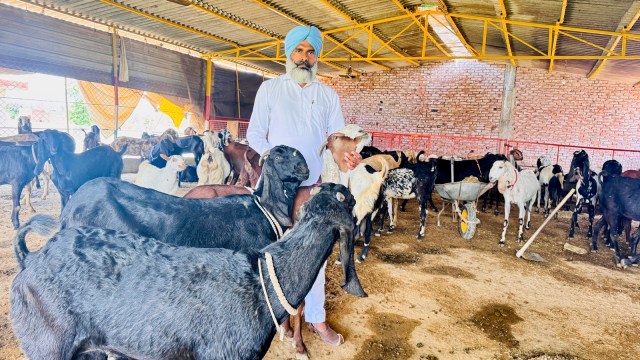From losses to triumph: A Marginal Farmer’s humble journey in goat breeding to becoming Punjab’s goat-farming tycoon
Determined to turn his fortunes around, he ventured into goat farming with just nine goats and recovered within a year the money he had invested in setting up his first small goat farm.
 Mann also took training from the Animal Husbandry Department and visited various farms in Punjab and beyond to learn the intricacies of goat breeding. (Express Photo)
Mann also took training from the Animal Husbandry Department and visited various farms in Punjab and beyond to learn the intricacies of goat breeding. (Express Photo)Balwinder Singh Mann, a marginal farmer with just 10 kanal (1.25 acres), lost Rs 1.15 crore in the past two decades but didn’t lose his heart, nor did he ever consider taking extreme measures. Instead, the 48-year-old farmer from Tungwali village in Bathinda district defied all odds to become one of the region’s most successful goat breeders, turning his farm into a thriving business worth several crores of rupees and doubling his holding from 1.25 acres to 2.50 acres.
Mann started breeding with just nine goats, and his hard work and tenacity turned his goat farm into Punjab’s first and the largest ‘Goat Mandi’ (market), particularly for Beetal goat breeding, drawing people from across the country and neighbouring countries to his goat farm.
“I started with an investment of not more than Rs 2 lakh and just nine goats purchased from local villages in late 2016,” Mann told The Sunday Express.
In the past eight years, however, he not only sold goats worth several lakhs of rupees, selling nearly 150 goats a year but also maintains a herd of around 300 goats at his farm at any given time. Even in 2020, when one of his goat sheds was destroyed by devastating winds, killing 72 goats and damaging properties worth Rs 65 lakh, he refused to give up.
To begin with, in 1992, after completing his 10+2, Balwinder became a beekeeper with just a few boxes and gradually expanded his operation to 870 boxes. However, soon, he lost all 870 beehives —worth Rs 50 lakh— in a theft. Shattered, Mann collected himself and ventured into dairy farming, which was enough to sustain his family but not enough to thrive beyond basic survival.
“I was earning just enough for two meals a day from my dairy business after facing a loss in beekeeping. Then, in 2016, I came to know about goat farming,” Mann recalls.
Determined to turn his fortunes around, he ventured into goat farming with just nine goats and recovered within a year the money he had invested in setting up his first small goat farm.
He also took training from the Animal Husbandry Department and visited various farms in Punjab and beyond to learn the intricacies of goat breeding. Mann focused on the Beetal variety of goats, known for their impressive size, beauty, and high-quality milk. Beetal goats can fetch between Rs 25,000 and Rs 50,000 each, a lucrative price that encouraged Mann to expand his operation. “Some of my goats were even sold for Rs 1 lakh and above,” he said.
With his first nine goats, Mann quickly saw results — these goats, all mature and pregnant at the time of purchase, gave birth to 18 kids within seven months, tripling his stock and allowing him to recoup his initial investment.Over the next few years, his farm flourished. By the second year, the number of goats on his farm had grown to 40. Now, he proudly owns 300 goats, maintaining a steady number despite selling a substantial number of goats every year. With goats reproducing twice in 14 months and averaging two kids per goat, Mann was able to expand rapidly. He sells nearly 150 goats annually, generating Rs 60 to Rs 70 lakh per year.
In addition to goat farming, Mann has diversified into sheep breeding, cattle farming, and even dairy production, maintaining a herd of 35 cattle, including five buffaloes.
“I am further diversifying and running a sheep farm with 100 sheep for breeding and sale purposes,” Mann said.
He plans to start processing goat milk into paneer and packaged milk. “Goat milk is highly sought after due to its medicinal properties. People are buying goat milk for Rs 80 to Rs 600 per kg and paneer for Rs 5000 per kg, as goat milk is recommended by doctors for chronic conditions like dengue fever and even cancer,” Mann said.
“It is important to enter the processing sector to capture the value of a product,” he explained.
Mann is regularly invited to schools and colleges to lecture students on how they can earn with goat farming while studying and inspire others to consider goat farming as a viable career path.
His farm has provided full-time employment to several individuals.
In 2023, he was awarded the Chief Minister’s Award by GADVASU (Guru Angad Dev Veterinary and Animal Sciences University), along with several other accolades from various organisations.
He is also rearing horses and has set up a small stud farm where he breeds ‘Nukra,’ an indigenous white horse, and Marwadi horses, which are typically black.
Mann said, “My story is meant to inspire those who have even the humblest beginnings—starting with just one goat can lead to extraordinary achievements with passion and hard work and earnings much beyond dollars.












